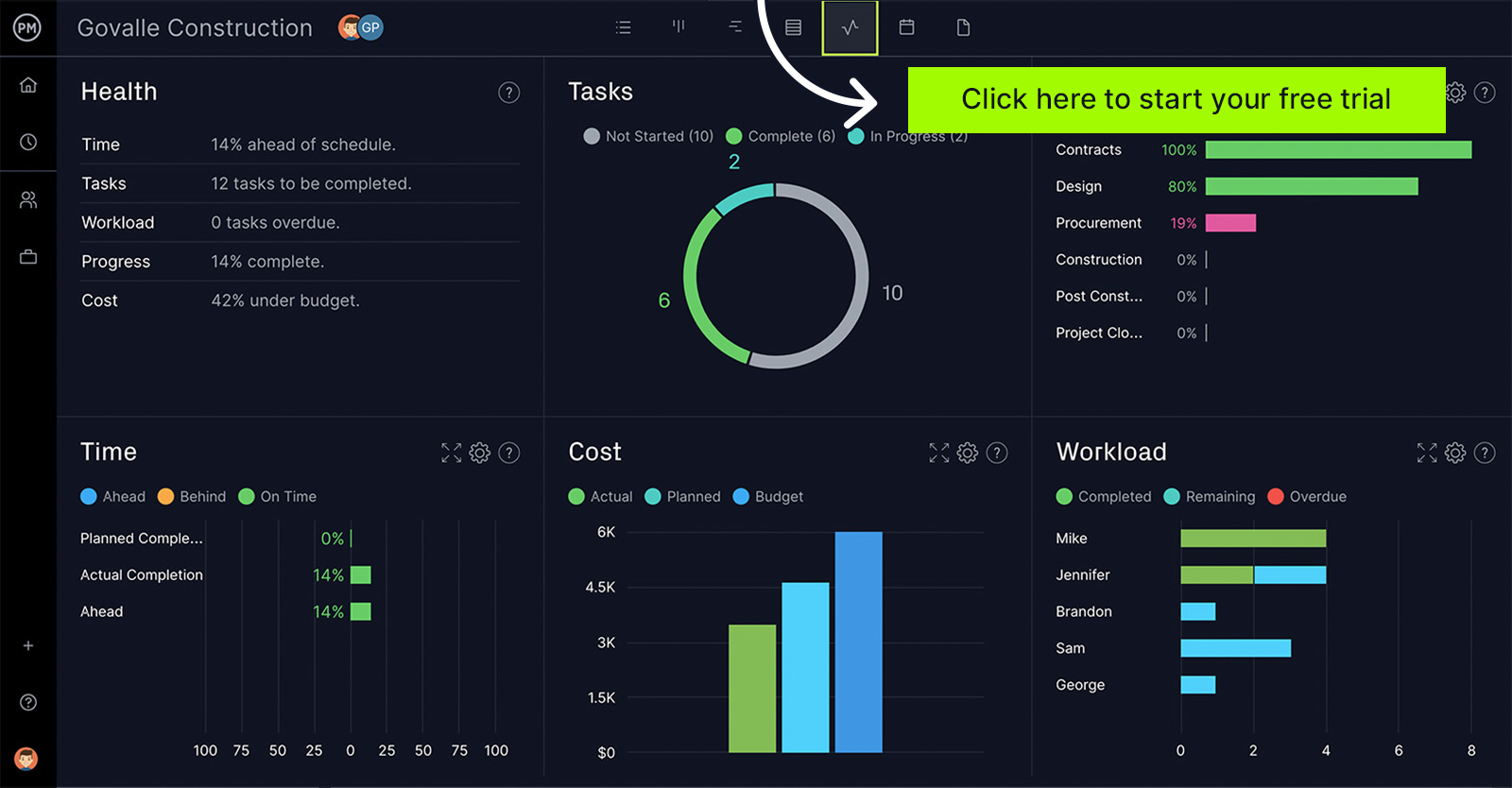
ProjectManager
by Megan Keup | Feb 15, 2022You know how it goes—you’re a few months out from a deadline, and your team isn’t anywhere close to finishing the project. You’re quickly running out of budget and time, and you’re starting to stress. Should you tell the stakeholders, or wait a little bit longer?
Well, you’re not alone at least, as this situation happens to more than 45 percent of all large-scale IT projects. For many, this comes both as a detriment to a project’s timeline and to the final product, with 56 percent of projects delivering less value than anticipated. Yikes. How can you stop this from happening? A cost management plan can help.
A cost management plan is a method of strategizing the planning and execution of a project’s budget. Of course, this is done in order to complete your project on time and on budget. However, without a proper cost management plan in place, both of those things will falter—costing you and your organization immensely.
What’s more, project success hinges on cost management, as cost is the primary determining factor for the success or failure of the venture overall.
Because a cost management plan is so important, you need to use project management software in order to track your costs. ProjectManager is a cloud-based work and project software that can track your project costs in real time. Build your plan on our award-winning Gantt chart, then track it with a live dashboard that requires no setup. You’ll always know if you’re meeting the cost management plan with ProjectManager, so get started today for free!

Cost management is sometimes also known by its more specific sub-task names, like spend management, cost transparency and cost accounting. It is typically made up of four steps: resource planning, cost estimation, budgeting and cost control. It’s strongly recommended that you use project planning software to assist you in the process of creating a cost management plan, as there will be many tasks, costs and resources to track.
Starting with the resource plan, project managers will typically use a work breakdown structure to show the project and its deliverables in a hierarchy from most important to least. This piece helps project managers to understand where the bulk of the costs will funnel towards, and which components of the project will require the least expenditure.
The second stage, cost estimation, is a process that’s iterative—meaning that it’s designed to change as the project changes. This stage uses many different estimation techniques that are determined by conceptual goals, historical knowledge, expert judgement, determinative techniques or a component-by-component basis.
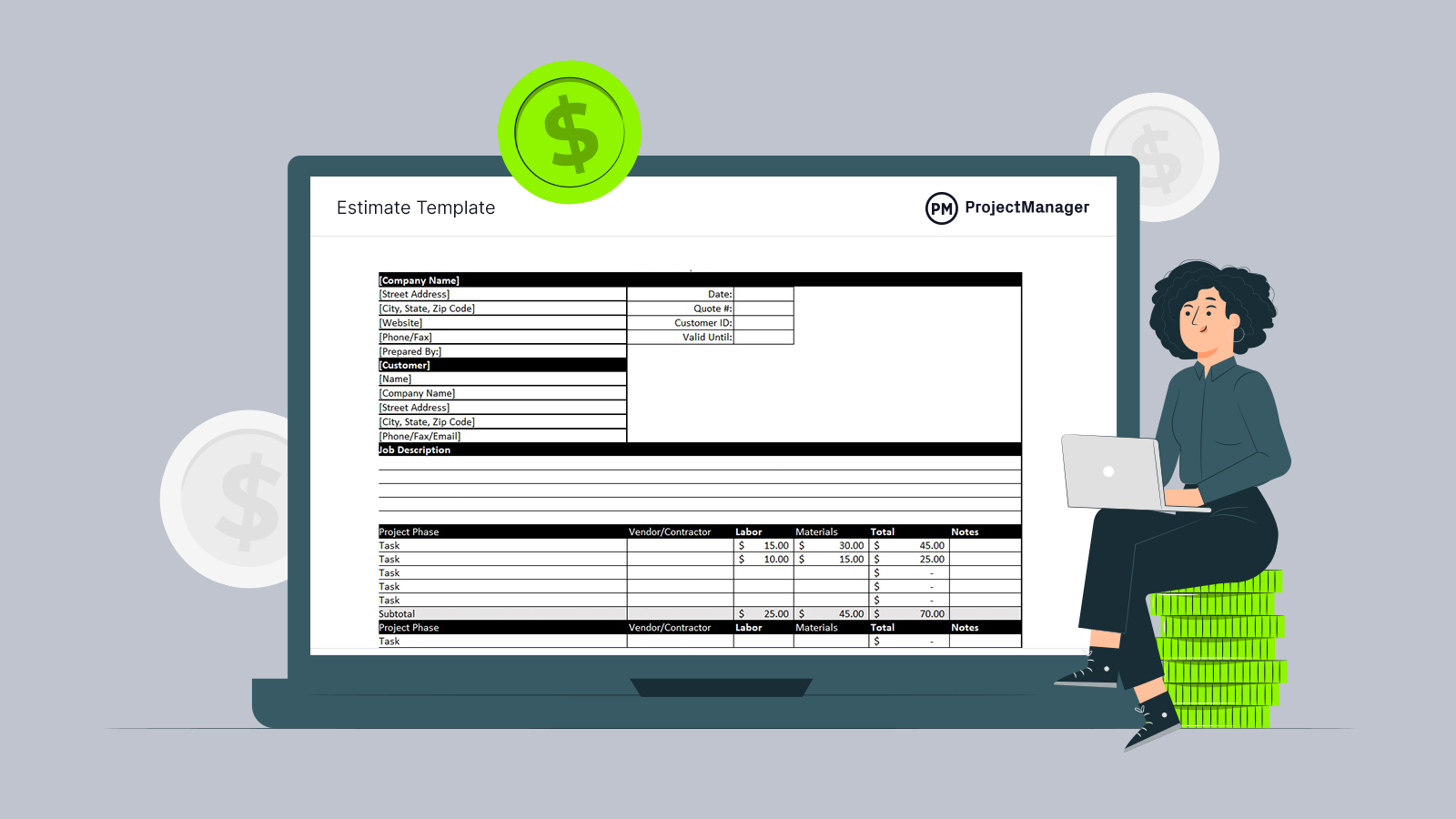
Use this free Project Estimate Template for Excel to manage your projects better.
Download Excel File
Historically-speaking, determinative techniques have been shown to be the most accurate. However, this process only makes sense to use once every last project detail has been mapped out—including the scope and deliverables. For projects that are lacking fine print, less accurate cost estimation techniques will still be valuable during this stage.
Now, the cost estimation phase might have felt like you mapped out your budget already, but really you just mapped out the blueprints for your budget. Your project budget will be a little more precise by this measure, and will enable the project to truly succeed.
Budgets are formed and approved after the estimation phase, and are typically released for the project in a series of phases depending on the project’s progress. This will help the project reach its milestones within each budgetary phase, rather than trying to match an overall project budget.
Cost control is simple—you’ll measure your project’s dollar value performance against your total cost and timeline. This will help provide a benchmark throughout the project process.
First, your requirements are established well in advance, during the project planning phase. Then, they are used as a method to challenge reasons for changes in cost. This will help to course-correct should a cost increase out of budgetary range and keep the project from ballooning out of control.
Ultimately, your cost management plan will help you to both plan for the project cost, and manage your project cost throughout the course of the project’s life cycle. As your project is underway, your project expenses will be thoroughly documented throughout the project so that your project can stay within budget.
In mapping out your cost management plan, you’ll need to do a lot of different calculations, practice many formulas and triple check your math when you’re done. But that being said, these actions go by many specific names. Let’s define them.
Half of your cost management plan is, well, managing your cost throughout the project lifecycle.
When monitoring your project’s cost, use your benchmarks, as they’ll be the key to decoding whether your project is on track, behind or over budget. Because of this, you’ll want to be able to see your planned progress against your realized progress to ensure you’re still on track. Many people use their project management workflow (whether that’s via the waterfall methodology, a Gantt chart or a kanban tool) to gauge this metric.
As stated above, making an estimate is one of the key steps of the project cost management process so we’ve created a free cost estimate template for Excel to help you complete this important task.
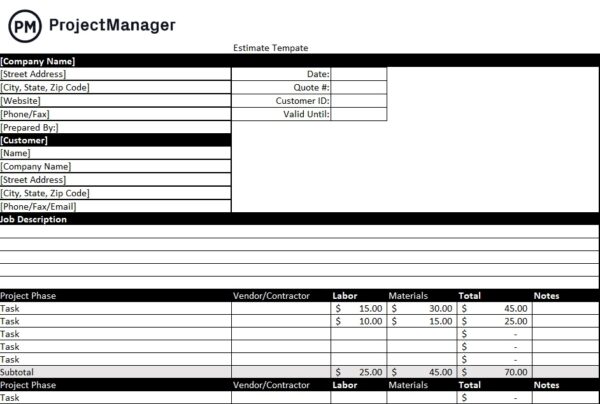
Knowing what not to do is as important as knowing what not to do when making a cost management plan. A cost management plan is complicated and mistakes can be made. The more aware you are of what those missteps are, the less likely you’ll be of taking them. Here are a few to be on the lookout for.
It’s more productive to manage your cost management plan with project management software, but if you’re not ready to invest in digital tools, there are templates that can act as a workaround. ProjectManager has dozens of free project management templates, many of which are great for cost management. We selected three of the best cost management planning-related free templates for you to download below.
A cost management plan begins with a project budget that forecasts all the costs associated with your project and helps you monitor those costs as you execute the project. Our free project budget template for Excel walks you through the budget process, from capturing labor and materials costs to other line items, such as travel, equipment and fixed items. There’s even a place to track your planned versus actual budget costs.
Keeping track of your cost management plan as you implement is how you keep to that plan. While real-time software is more accurate and involves less work, you can input data into our free project dashboard template for Excel and see how your costs are with easy-to-read graphs and charts. That way you can catch when costs exceed your planned costs and adjust accordingly to stay within your budget.
In order to execute your cost management plan, you’re going to need to have a set of tasks assigned to team members. Our free action plan template for Excel outlines those steps to turn your strategy into reality. You’ll find space to list your tasks and in what phase of the project you’ll execute them, their priority, who’s assigned, duration, start and due dates, resources necessary and even the status of the work being done.
Whether your next project is large or small, you’ll need to make sure your cost estimation is as accurate as possible, and easy to manage long-term.
With ProjectManager, you’ll have the power to customize your project reporting to get only the data you need, plus you’ll be able to see actual project progress on team members and their tasks.
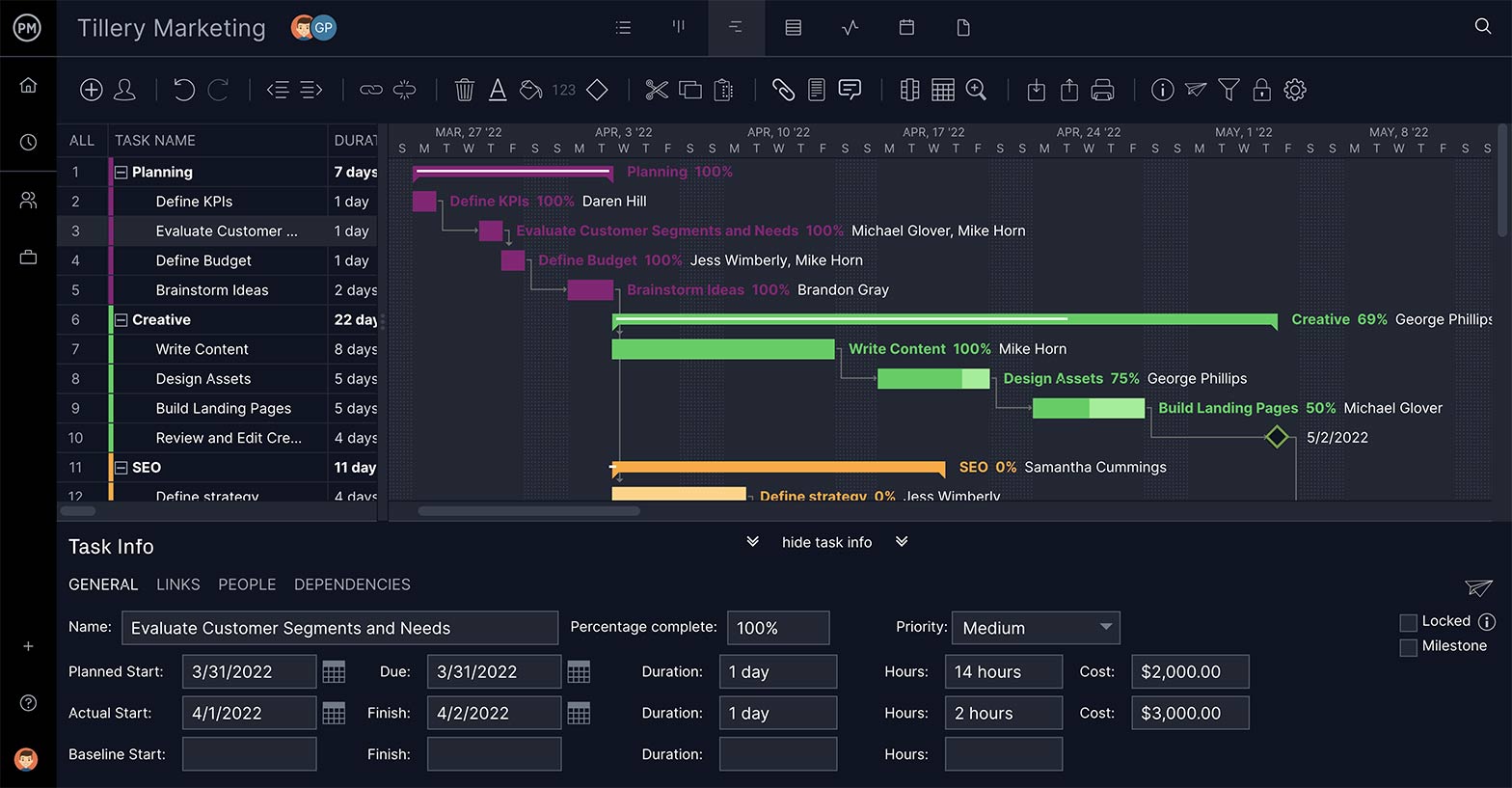
And whether you’re using determinative techniques, historical data, analogous estimation or three-point estimation to gauge your project cost estimates, you’ll have a tool that can plug in your project data and calculate your estimates for you. Additionally, with our real-time dashboards and project reporting features, you’ll be able to get a visual on the estimated benchmarks of your project, so you can see if you’re ahead or behind schedule with the click of a button.
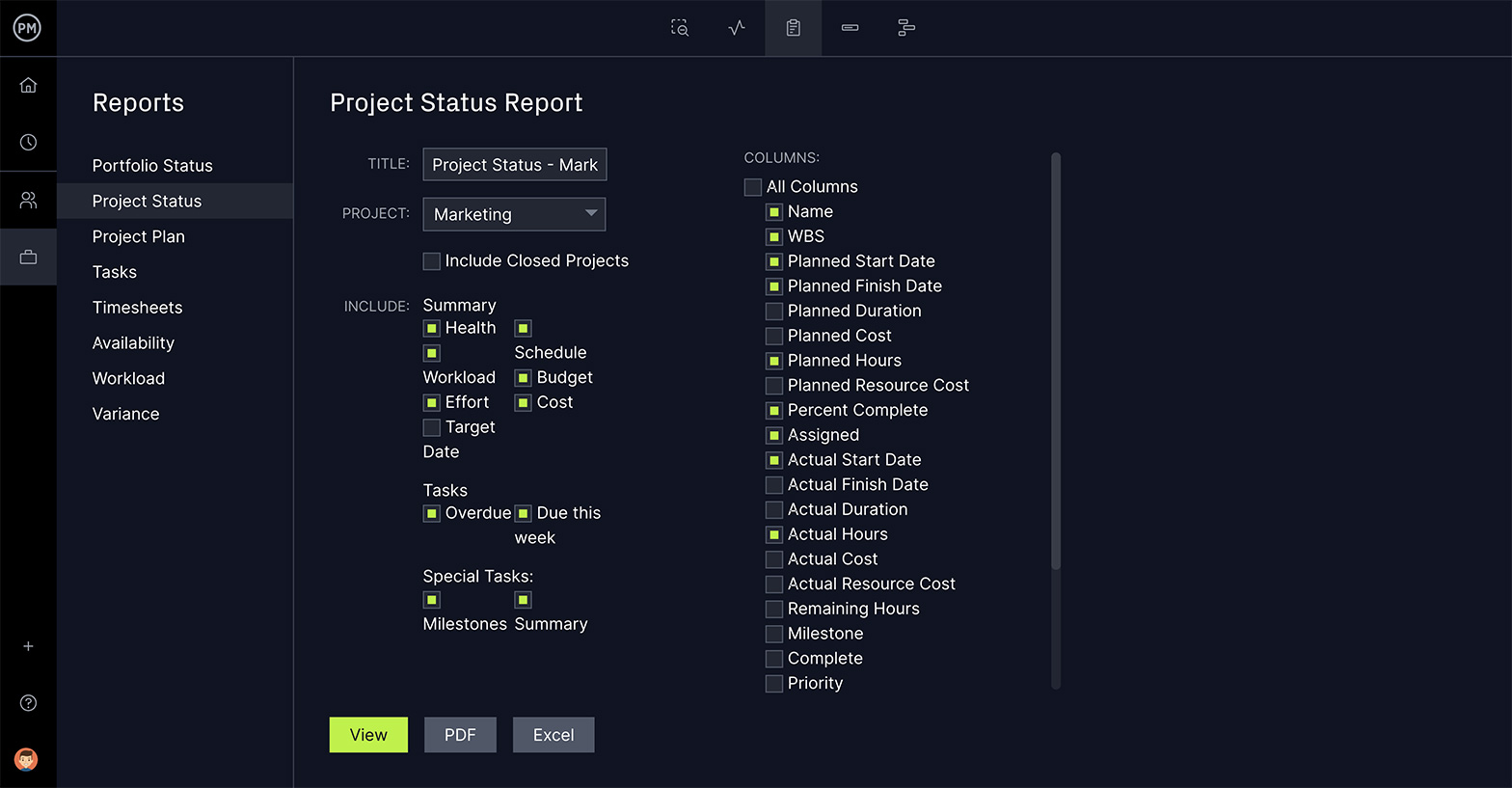
Estimating your costs and getting an accurate reading before project kickoff is one of the most important components to ensure project success. That’s why ProjectManager is dedicated to giving teams the software they need to plan cost estimates, employ a management plan and collaborate effectively no matter where they’re located. Sign up for a free 30-day trial of ProjectManager today.